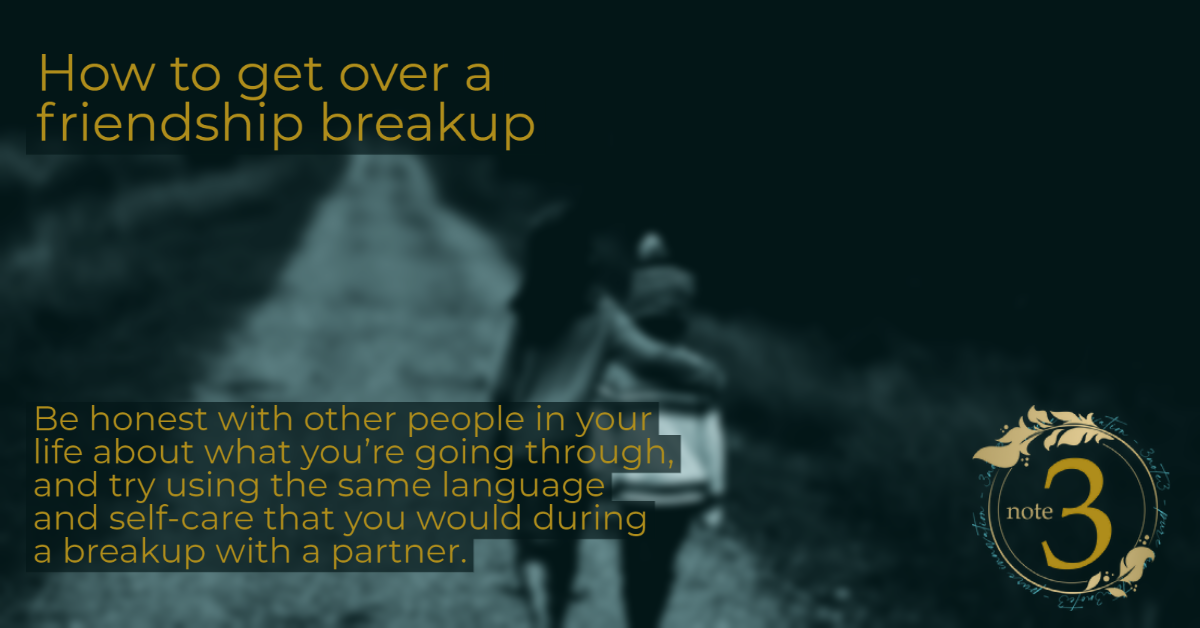How to get over a friendship breakup
The loss of a friendship can be devastating.
Whether it’s the slow drifting apart from a childhood friend, the sudden, sharp distance created by a disagreement, or one of the many relationships that have quietly fallen away during the pandemic, losing someone that you thought would always be in your life is profoundly jarring.
But friendship breakups will happen over the course of our lives, and we need to start learning how to deal with them in healthy ways, says friendship coach Danielle Bayard Jackson.
The most significant thing we need to do, says Jackson, is normalize the fact that sometimes friendships do end and that can actually be healthy. However, we haven’t been taught to carry this expectation into our friend relationships.
“We’re not looking at our friends through a lens of ‘Gosh, I hope this works out’, but we’ll do that with a romantic partner for sure,” says Jackson. “With a partner, we wonder if they’re going to be the one. But with friends, we assume they’re the one from the minute we establish that we like each other.”
And because we don’t view the loss of a friendship as a normal occurrence, it feels like a personal failing when it happens and something we should be ashamed of. Or, as Jackson puts it, “If friendship is supposed to be easy and yours ended, what did you do wrong?”
But that isn’t the case.
Friendships, like any relationship, sometimes aren’t meant to be — and even if they are, maintaining them takes real work. Kristen Newton has been interested in this work for years and founded HEARTConvos, which aims to help people who feel stuck in unsatisfying friendships have the kind of open and honest communication that keeps a friendship healthy.
“[Otherwise] I think we feel blindsided because we belittle the value and significance of our social connections and friendship. Yet we recognize the weight that they carry when they don’t work out, and we experience that hurt and disappointment,” she says. Here, she and Jackson share their advice.
How do you get over a friendship that has ended?
1. Give yourself space to grieve the loss
This is the most important place to start. Be honest with other people in your life about what you’re going through, and try using the same language and self-care that you would during a breakup with a partner.
“Definitely get the ice cream!” says Jackson. “I think some of us try to be tough, and it feels a little juvenile — maybe a little vulnerable — to say ‘My feelings are hurt and I am sad over a friendship’. Feel the feelings the same way you would grieve over a romantic breakup.”
Newton agrees. “To the brain, a breakup is a breakup,” she says. “Sometimes people are wrestling through stages of grief. Then you start asking yourself: ‘Was I unhealthily attached to this person in a romantic way?’ [Because] I’ve only ever associated this type of pain in a romantic connection or with an egregious hurt in my family.”
But friendships are just as important and the feelings tied up in them just as profound — more even, because we expect them to last much longer. When Jackson posted a TikTok about this emotional significance of friendship early in 2021, the comments took an unexpected turn. “I was surprised by how much pain there was surrounding lost friendships. That wasn’t even what the video was about, but that’s where the conversation went. So I think a lot of us are still hurt by those things and looking for a space to process how to move on.”
2. Get closure, if you can
With a romantic partner, there’s usually a breakup conversation and you know that you’re either in the relationship or you’re not, says Jackson. “But the very blurry nature of starting and ending friendships makes it hard to navigate to the end — because when is it the end?”
Newton recommends “diagnosing” what has gotten you to where you are — this means asking yourself a lot of questions. What exactly happened? How is it affecting me? No, how is it really affecting me?
Then, you can do your best to get clarity from your friend at this stage. “You can think about why everything is settling the way that it is. That is not in an effort to change the other person’s mind, but just so that you have a sense of closure as you’re going into that loss,” Newton says.
If a friendship has ended badly, this may mean accepting that you won’t get to have a final conversation with them, says Jackson. “Try your best to stop replaying and rehearsing what you should have said. But if a part of your healing process might be to say your piece, or to apologize if you are the one who did something wrong, then you need to apologize whether they write you back or not.”
3. Identify what you need to do to move on
“Once you have a proper diagnosis of the impact of the breakup on your life and on your mental and emotional state, then you can treat it properly,” says Newton.
This might mean talking through things with someone you trust, creating space for yourself to grieve some more, or removing things from your life that trigger memories you’re not quite ready to process yet.
Jackson recommends moving towards using the language of gratitude. “Once you can start to put the relationship in the language of the past tense and say, ‘You know what, I’m so thankful they were in my life during this season,’ you can have gratitude for it and not feel bitter.”
4. Assess the health and boundaries of your other friendships
One of the biggest worries that comes with a friendship breakup can be how it will impact your wider group of friends. Trust these other connections, says Newton, and don’t try to hide what’s happening. “If I cut off my hand, the rest of the body is going to notice that I don’t have a hand anymore. But when friend groups don’t have healthy boundaries as a part of their friend culture, if one person falls out with another person within the group, the whole group is going to fall away.”
Great, you’re thinking — even more loss! But if that’s what ends up happening, it means those friendships weren’t healthy to begin with, and they are not well set up to support you. A huge part of maintaining healthy boundaries, says Newton, is realizing that it’s OK to have different levels of connection with each other within a group. You can feel very close to some people; others only enter your life because they are friends with your friends.
Make it a habit to take the pulse of your most important friendships regularly. “Be in the habit of debriefing your relationships, keeping tabs on one another and saying ‘Hey, how are we doing?’,” says Newton.
It’s easy to assume our friends will always be there, but close relationships require maintenance. This involves having very real conversations, and regularly checking in with each other in a meaningful way that can flag problems before they become problems.
5. Remember that you still deserve friendship
It’s not always easy to meet new people, especially once you get past your 20s, but it’s important not to let the loss of one friend make you feel unworthy.
“I see it become a barrier sometimes to making new friends,” says Jackson, “because we find so much of our identity in our friends. So when a friendship is over, what does that mean for me and who I am?” Losing that sense of belonging and acceptance is hard and all the more reason to work on developing an unconditional sense of self-worth that is innate and can support you through difficult times.
Lastly, Newton says, it is important to understand that “the overwhelming sense of emotion that we feel amidst a breakup sometimes can feel paralyzing.” It can be very difficult to cope with. “Give yourself the freedom and permission to feel what you feel, remind yourself of what is true, and act on what you believe.”


